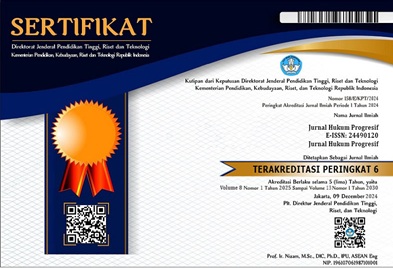ANALISIS PERAN PENGADILAN PAJAK DALAM MEWUJUDKAN KEADILAN FISKAL DI INDONESIA
Kata Kunci:
Pajak, Pengadilan, HukumAbstrak
Pengadilan Pajak adalah sistem perpajakan dan penganggaran suatu negara harus dirancang dengan keadilan fiskal sebagai dasar pemikirannya. Gagasan ini bukan sekadar titik awal yang penting bagi inisiatif yang bertujuan mencapai pertumbuhan ekonomi yang berkelanjutan dan adil. Namun, hal ini juga diakui sebagai landasan utama untuk menjadikan penilaian dampak redistributif kebijakan fiskal sebagai prioritas utama dalam Tujuan Pembangunan Berkelanjutan (SDGs). Salah satu pilar utama keadilan fiskal adalah gagasan tarif pajak progresif. Menurut teori ini, orang yang berpenghasilan lebih banyak harus membayar persentase pajak yang lebih besar. Mencegah beban pajak yang tidak adil terhadap masyarakat berpendapatan rendah adalah tujuan utamanya. Permasalahan yang perlu diatasi adalah bagaimana menerapkan tarif pajak progresif ini secara bijaksana dan efektif tanpa menghambat investasi dan ekspansi ekonomi. Program-program yang meningkatkan kesejahteraan masyarakat harus didanai dengan dana pajak. Penting untuk diingat bahwa kesenjangan ekonomi yang ekstrim dapat membahayakan stabilitas sosial dan ekonomi, meskipun keputusan ini mungkin kontroversial. Selama beberapa dekade terakhir, struktur perpajakan Indonesia telah menarik banyak perhatian, karena kerangka kerjanya tidak banyak berubah. Pengadilan Pajak yang ada sekarang ini berkedudukan di Jakarta seperti pada Pasal 3 UU No. 14 Tahun 2002.
The Tax Court is a taxation system and a country's budgeting must be designed with fiscal justice as the basis of thought. This idea is not just an important starting point for initiatives that aim to achieve sustainable and fair economic growth. However, this is also recognized as the main foundation for making the assessment of the redistributive impact of fiscal policies a top priority in the Sustainable Development Goals (SDGs). One of the main pillars of fiscal justice is the idea of progressive tax rates. According to this theory, people who earn more should pay a larger percentage of taxes. Preventing unfair tax burdens on low-income people is the main goal. The problem that needs to be solved is how to apply this progressive tax rate wisely and effectively without hindering investment and economic expansion. Programs that improve public welfare must be funded with tax funds. It is important to remember that extreme economic inequality can jeopardize social and economic stability, although this decision may be controversial. Over the past few decades, Indonesia's tax structure has attracted a lot of attention, because its framework has not changed much. The current Tax Court is located in Jakarta as in Article 3 of Law No. 14 Year 2002.





